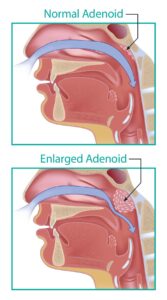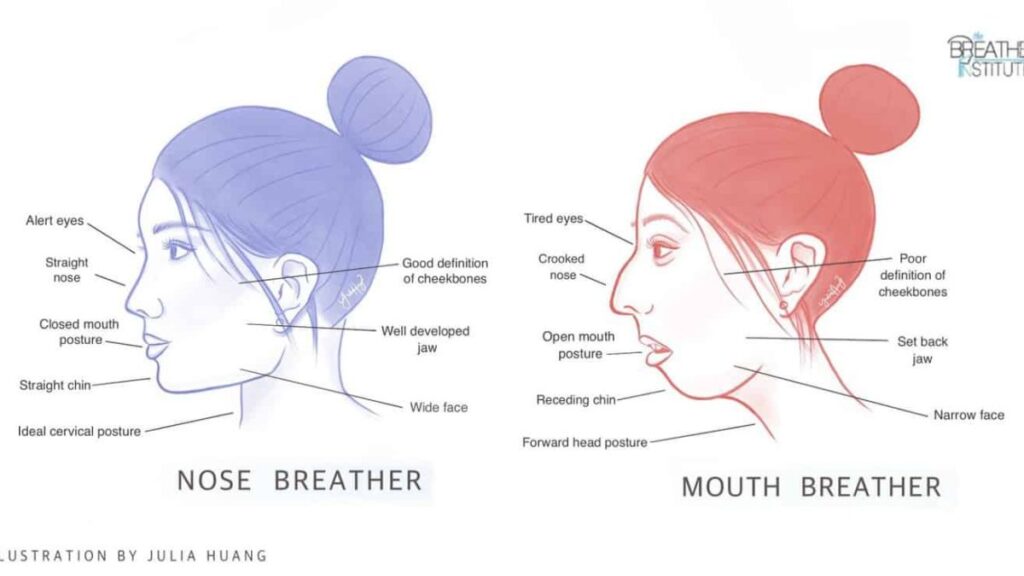As a dentist who works closely with families and growing kids, I often get asked about habits that seem harmless but could actually affect a child’s long-term health. One of those habits? Mouth breathing.
If you’ve noticed your child breathing through their mouth (especially while sleeping) you are not alone. But what many parents don’t realise is that chronic mouth breathing can impact far more than just how your child breathes. It can affect their facial development, oral health, sleep quality, behavior, and more.
Let’s talk about the signs, why it matters, and what you can do to help your child breathe, sleep, and grow better.
Why Does Mouth Breathing Happen?
There are a few common reasons kids become mouth breathers:
- Ongoing nasal congestion from allergies or colds
- Enlarged tonsils or adenoids blocking the airway
- Habitual mouth posture or poor tongue placement
- Underlying jaw or facial structure issues
It might start with a stuffy nose, but if it continues over time, mouth breathing can become a hard habit to break….and that is when we start to see the hidden consequences.

What Mouth Breathing Does to a Growing Child
Here is how long-term mouth breathing can quietly affect your child’s development:
1. Changes in Facial Growth
When a child breathes through their mouth instead of their nose, their tongue often sits low in the mouth instead of pressing gently against the roof of the mouth (which is where it should be). Over time, this can lead to:
- Narrow dental arches
- Longer face shape
- Crowded or misaligned teeth
- Changes in bite (overbite, underbite, crossbite)
These are often things I notice early on during a dental or orthodontic exam.
2. Poor Sleep and Daytime Fatigue
Mouth breathing is closely linked to disrupted sleep. Kids who breathe through their mouths at night often:
- Snore or breathe noisily
- Wake up frequently
- Have dry mouths in the morning
- Struggle to stay focused during the day
3. Speech and Swallowing Issues
A low tongue position and open-mouth posture can also interfere with:
- Clear speech
- Proper swallowing patterns
- Oral muscle development
Sometimes, I work closely with speech therapists or myofunctional therapists when these concerns come up.
4. Higher Risk for Cavities and Gum Issues
Saliva plays a big role in keeping the mouth clean. When a child is constantly breathing through their mouth, saliva dries up, which increases the risk of:
- Tooth decay
- Bad breath
- Gum inflammation
- Oral discomfort

How to Tell If Your Child Is a Mouth Breather
Here are a few signs I encourage parents to watch for:
- Open mouth during sleep
- Chapped lips or dry mouth in the morning
- Frequent stuffy nose without being sick
- Snoring or noisy breathing at night
- Tiredness despite “sleeping” all night
- Forward head posture or long facial structure
If you’re seeing more than one of these signs, it might be time to look a little deeper.
What I Can Do to Help
As a family and pediatric dentist in Subang Jaya, one of my goals is to catch early signs of problems before they become bigger issues. When I see signs of mouth breathing, I evaluate:
- Your child’s airway and breathing
- Tongue posture and muscle tone
- Jaw growth and dental alignment
- Any signs of sleep disturbance
Sometimes, we can work on gentle interventions—like early myofunctional braces treatment—to expand the airway and promote proper growth. In other cases, I may refer you to an ENT or sleep specialist for a full evaluation. My approach is always collaborative and tailored to what’s best for your child.
Not Sure Where to Start? Let’s Talk Virtually
If you’re worried about your child’s breathing but not quite ready for an in-office visit, I offer virtual consultations for families in Klang Valley, Subang, Malaysia and nearby areas.
We can talk face-to-face, discuss your concerns, and I can help guide you on what steps to take next.
👉 Book a virtual consultation here
Final Thoughts from a Local Dentist
Mouth breathing is more than just a quirk—it is often a red flag for deeper issues with breathing, growth, and sleep. The earlier we catch it, the easier it is to correct. If you have questions or just want to chat about what’s normal and what’s not, I’m here to help.